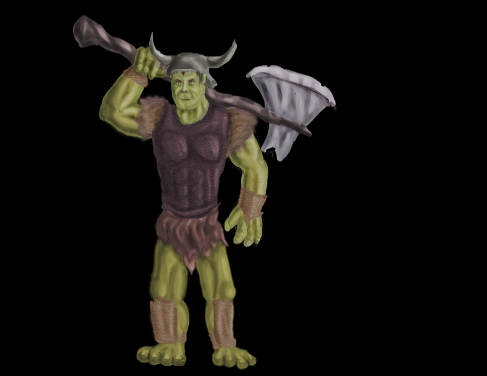
Ever since Lord of the Rings, the orcs have been picked on (considering they pretty much first appeared in those books, they've been picked on forever). Normally, they are a race of misshapen, or at least ugly, large humaniods that are stronger than they are smart. Often, they are evil, and make up the armies of the enemy, an almost limitless host that dares the good guys to defy the odds.
When talking of orcs, often they're more of a conglomeration of creatures of legend. Goblins, trolls, ogres, and others can often fit into the category 'orc'. Usually, they are big, ugly, and mean. Oftentimes they are green or brown, but they can pretty much be any color or size. The term is so general it can mean anything, really.
Lately, they've been given a little slack. Tolkien first created them as parallels to the Nazis. We don't live in a world of Nazi Germany anymore, though, so there are no clear enemies like there were then. There's no country we can point to and say, "They're evil." Some of the communist countries might have challenged, but since the collapse of the USSR, they're not so much a threat. Islamic extremists have caused us problems, but most are quick to point out that they don't represent the overall Muslim population. So, like I was saying, without any clear enemy, our need to symbolize a race of evil in fantasy has diminished. Some dark lords still use orcs or other similar races for recruitment, while others just use good old humans. The orcs are becoming more like the Na'vi in Avatar: noble savages.
In Warcraft 3 and World of Warcraft, for example, (Real time strategy and massive online role playing video games, respectively), the objective of defeating the evil orcs changed to defeating evil demons and undead. It does make them more dimensional than the evil creatures they were before, because let's face it. No culture or nation is completely evil. Even Nazi Germany had good people, they were just unable or unwilling to act out against the evil leaders put in place by Hitler, as well as not realizing at the time how he was slowly changing the nation into a monster (a dire warning for us: if any president starts radically changing the country, it probably isn't for the better).
Just like the real world, most think orc points of view should be represented in fantasy, instead of blindly pointing to them as evil monsters. It gives the world more complexity and points to more modern views: no culture is pure evil or pure good. There can be more depth to the orc race, and there are many possibilities for them to play roles they couldn't before. It is interesting that the orcs can be explored beyond their evil origins, and there is material to be used, but it gives us the question: if they are no longer just the bad guys, but are as dynamic in morality as humans, is there really any need to have them? Why not just have humans take their place?
So the future of the orc maybe isn't as bright as they thought after their change of heart. They will at least be around for two more Hobbit movies in their evil form. after that, who knows? The noble savage idea is already getting a little old itself. Were indians and africans really all that closer to mother earth? Would they have abstained from ripping her apart if they had the means? Who knows? But maybe the new role of the orc will be mother nature's champions. It wouldn't be a huge leap.
After all, they've already gone green.
Reblogged from http://sageeyesblog.wordpress.com/2013/01/23/orcs/

No comments:
Post a Comment